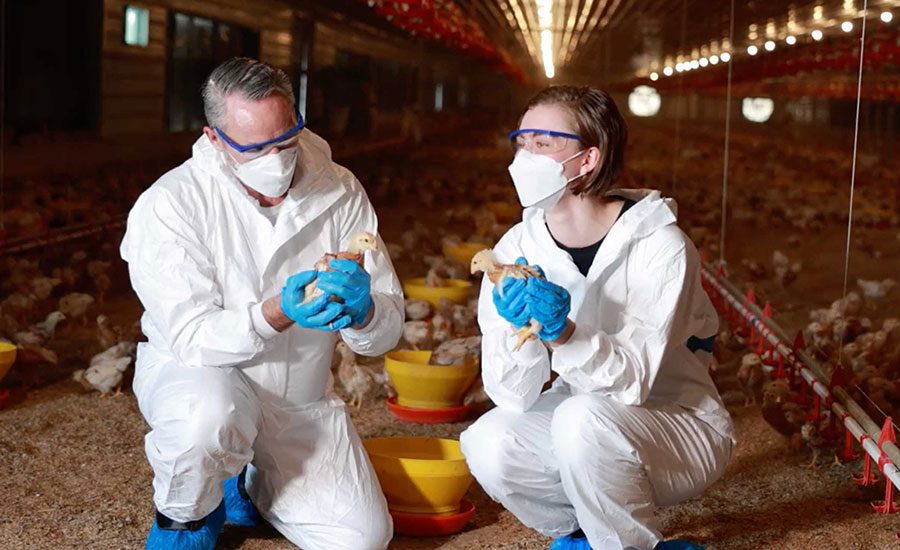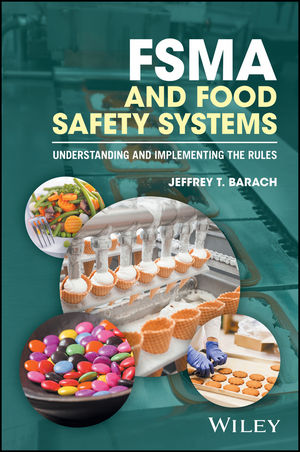As with any activity in today’s busy world, the first thing you may want to know is why you, as a food safety professional, should spend your time reading this article. The main reason is because we believe it will help you understand the roles that the Association of Food and Drug Officials (AFDO) and its members play in the food safety community and how we can work together to minimize risks to the public. AFDO members include state and local officials who are the first responders to food illness and food emergency episodes; they audit facilities and interact with their federal counterparts. They have been called by many the “boots on the ground.” AFDO members would like to get to know you before a crisis, rather than during one. Given the imperative by the Food Safety Modernization Act (FSMA) to be proactive, rather than reactive, it is essential that AFDO be front and center in that effort.
What Is AFDO?
AFDO is an international nonprofit organization that is in the forefront of streamlining and simplifying regulations by either drafting regulatory rules or commenting on government proposals. By developing a broad base of support for new approaches, AFDO has become a recognized voice in determining the rules and shape of the regulatory playing field of the future (see “The Birth of the Integrated Food Safety System”). The consensus that AFDO develops is key to advancing uniform laws, regulations and guidelines that result in more efficient regulation and less confusion within the industry in the marketplace. AFDO develops support for its positions by interfacing with high-level regulatory officials, industry representatives, trade associations and consumer organizations. This continues to significantly impact regulations at the federal, state and local levels.
AFDO provides services and support to government food safety regulatory officials by establishing broad-based communication networks, providing investigation and inspection tools online, representing state and local officials through public comment and response to new federal regulations and initiatives and by promoting the enormous amount of food safety work performed at the state and local levels.
AFDO’s Vision
AFDO is an international leader and trusted resource for building consensus and promoting uniformity on public health and consumer protection issues related to the regulation of foods, drugs, devices, cosmetics and consumer products. Over its 100-year-plus history, AFDO has understood the connection between uniform, science-backed production and inspection standards across the food supply chain and safer food for consumers.
AFDO and its six regional affiliates provide the forum in which regional, national and international issues are deliberated and resolved to uniformly provide the best public health and consumer protection in the most expeditious and cost-effective manner.
For example, AFDO’s Southern States affiliate AFDOSS partnered with industry officials, academia and the U.S. Food and Drug Administration (FDA) to begin the Seafood Hazard Analysis and Critical Control Points (HACCP) Alliance. AFDO accomplishes its mission by:
• Promoting education, communication and cooperation between government, industry and consumers
• Fostering understanding and cooperation between industry, regulators and consumers
• Promoting the adoption and uniform enforcement of laws and regulations at all levels of government
• Providing guidance and training programs for regulatory officials and the regulated industry to promote nationally and internationally uniform inspections, analyses, interpretations and investigations
• Identifying and resolving inconsistencies in consumer and public health protection laws, standards and policies
• Providing a permanent working committee structure to research current issues, obtain input from interested parties and produce recommendations for action
• Developing model laws, regulations and guidance documents, and seeking their adoption throughout the United States
• Obtaining, developing and disseminating information that increases local, state and federal regulatory agencies’ ability to prevent the deliberate contamination of food, drugs, medical devices, cosmetics and other consumer products, and increase the ability of these agencies to detect, contain and recover from any act of consumer product terrorism
• Conducting an Annual Educational Conference, during which, for over a century, AFDO has provided the opportunity for individuals from government, industry and the public to participate, listen and learn valuable information and develop initiatives concerning food, drug, medical device, cosmetic and product safety issues
History
Elliot Grosvenor, Michigan dairy and food commissioner, and Joseph Blackburn, dairy and food commissioner of Ohio, are credited with the founding of AFDO in 1896. These two state officials met in Toledo, OH, to discuss the relationship between their states and the difficulties of manufacturers producing food products in one state and shipping them to another where they were being condemned. They determined the best course was to call a meeting of all states and form an association in which solutions relating to nonuniform state laws could be addressed. Thirty-three representatives of state dairy and food departments from 10 states assembled in the Turkish Room of the Cadillac Hotel in Detroit in July 1897, and the National Association of State Dairy & Food Departments was born. The states represented at this meeting were Colorado, Connecticut, Iowa, Massachusetts, Michigan, Minnesota, New York, Ohio, Pennsylvania and Wisconsin. Meetings for AFDO have been held annually ever since. AFDO is a full 10 years older than FDA, which came into existence in 1906 with the passage of the Pure Food and Drug Act.
Harvey W. Wiley, known as the “Father of Food and Drug Law,” was an active member of AFDO during these early years (see “Dr. Wiley and AFDO”). He actually encouraged the states to pass laws in areas where he felt the federal government was lax. That philosophy continues to this day as AFDO publishes model codes and guidance for such areas as cottage foods, cured, salted and smoked fish and salvage foods, all of which have been used in adopting state regulations. Many of the early battles that existed in developing federal laws were fought at AFDO’s annual conference. Transcripts of many of these early conferences are still available for review in books and within the American Food Journal, which published convention transcripts from 1906 to 1917. AFDO reprints some of these old publications and includes them in the fall edition of the AFDO Journal. Many of the issues that existed and were debated over 100 years ago still exist today. Uniformity, for instance, has been the subject of many speeches and published articles throughout AFDO’s 117 years. Uniformity in legislation and rulings relative to food products was a major concern from the very outset and continues to be an issue today. The strong connection between AFDO members allows the organization to advance important efforts very smoothly and quickly.
Members
Regular voting members of AFDO are from government regulatory agencies only. Only regular members may serve as voting members of committees and the AFDO Board of Directors. Other memberships are available to industry, academia, students and consumer officials, all of whom are free to participate in any of the many AFDO committees (see “The 1909 Battle of Denver”).
Affiliates
 Each year, one regional affiliate cohosts the AFDO Annual Educational Conference. The affiliates are independent associations that have their own membership, board, committees, conferences and training opportunities. A current list is provided in Table 1.
Each year, one regional affiliate cohosts the AFDO Annual Educational Conference. The affiliates are independent associations that have their own membership, board, committees, conferences and training opportunities. A current list is provided in Table 1.
Relationship to Federal Agencies
AFDO has federal advisers who serve on its board of directors to help address issues that state and local officials may have with the federal counterparts they deal with daily. These federal advisers are from FDA, the U.S. Centers for Disease Control and Prevention, the U.S. Department of Agriculture Food Safety and Inspection Service (USDA FSIS) and the Department of Homeland Security. Face-to-face meetings are held with high-ranking officials from these agencies each year in Washington, DC, where AFDO promotes state and local activities along with other recognized national food safety ventures. AFDO routinely provides official comments to these federal agencies on behalf of state and local officials. These official comments relate to new federal regulations or initiatives and offer a consensus opinion of the impact these may have on state and local agencies. In addition, AFDO places representatives on multiple federal advisory boards, work groups and task forces to ensure representation by state and local agencies. As food safety mandates become more extensive, the need for a strong, well-integrated relationship between federal rulemakers and state authorities becomes clear. In the case of food emergencies, effective state response in helping contain contamination outbreaks and informing consumers can be a critical line of defense. That is why AFDO believes that if state and local authorities are to play their necessary roles in creating a national safe food system, they must be empowered to collaborate effectively with their federal counterparts.
Our food safety partners to the north, both Health Canada and the Canadian Food Inspection Agency, are also represented on our board of directors. We have much to learn from one another and work closely on all issues regarding food safety and food security.
What AFDO Brings to Food Safety
AFDO’s greatest asset may be its unwavering service and strong representation it provides to state and local food safety officials. AFDO was first to offer a vision of a national integrated food safety system in 1998 and has been on the forefront of pressing FDA to adopt this system. The association is credited with establishing the International Food Protection Training Institute (IFPTI) and its infrastructure in Battle Creek, MI, in a little over 1 year. It has fought national legislative proposals and bills that would preempt or limit state and local government authorities and capabilities for protecting its citizens. It works closely with industry and academia to develop necessary and specifically requested training for both industry and regulatory arenas. AFDO represents state and local agencies on several boards of directors, including the Partnership for Food Safety Education and the IFPTI.
Impact on Food Producers, Retail and Foodservice, Distribution, Training and Auditing
AFDO associate members from industry are provided the opportunity to informally network with state and local food safety program managers at meetings, conferences and through website communication tools, which allows industry a forum for resolving disputes. Since the overwhelming majority of regulatory work performed in this country is performed at the state and local levels, industry officials find the informal opportunities very useful. AFDO addresses emerging issues on a routine basis and has worked in the past with industry to develop intervention strategies addressing these issues. An example of this includes the Listeria monocytogenes training programs developed for retail establishments with Penn State University and the Food Marketing Institute. Model code guidance documents that relate to current food safety issues are developed as needed. Examples of these include the AFDO Model Code for Produce Safety, Imported Food Guidance, Cottage Food Regulatory Guidance and Meat and Poultry Processing at Retail Guidance. AFDO has a well-established history of responding to the needs of its membership where issues exist.
AFDO has participated in the development of the following food safety entities:
1) Seafood HACCP Alliance — originated through AFDOSS in 1996, this alliance served as the model for the several alliances now developed and operating to address juice, produce safety, food safety preventive plans and sprouts. Since its inception, the Seafood HACCP Alliance has conducted over 1,670 training programs, which have trained over 29,000 individuals.
2) IFPTI — developed with a grant from the Kellogg Foundation and working with officials from Battle Creek, MI. AFDO formed an advisory group consisting of numerous government, industry and consumer organizations to help direct the development of the institute. IFPTI now operates under its own infrastructure to train food safety officials from government and industry both internationally and domestically.
3) Manufactured Food Regulatory Program Alliance (MFRPA) — through an FDA Cooperative Agreement, AFDO formed MFRPA, consisting of state-manufactured food program managers from all states, who contract with FDA to perform manufactured food establishment inspections. This alliance assists these states in meeting program standards and will help FDA meet the mandates of FSMA.
Throughout its history, AFDO has been credited with establishing many similar cooperative ventures to advance food protection. This is oftentimes completed with little if any fanfare. AFDO does not work for fanfare but for food protection officials because it’s the right thing to do.
AFDO Resources
AFDO recently developed a regulatory issue form that industry can utilize to identify a rule interpretation concern or dispute. AFDO accepts these forms through its Laws & Regulations Committee and attempts to resolve each issue. AFDO has always demonstrated a willingness to work with the food safety community in areas of education, training and issue resolution.
Current website resources that AFDO provides include the following:
1) Directory of State & Local Officials — available to everyone, this directory provides contact information for state and local officials such as state agriculture, health, environmental conservation, consumer protection, attorney general and boards of pharmacy. AFDO has expanded the directory recently to include FDA and USDA FSIS offices, Indian Health Services, state food laboratory directors, state epidemiologists, local health agency websites and industry emergency contact officials. The directory is very user friendly and contacts can be obtained by using a state map or the use of keywords.
2) Subject Matter Expert (SME) Registry — available to everyone who may wish to contact an individual in a specialty food safety area. The SMEs database supports the MFRPA’s mission of community building, information exchange and a national integrated food safety system. This database continues to grow with contributions from AFDO and FDA. The database is also user friendly, allowing individuals to obtain SME contact information by name or area of expertise.
3) Topical Index of Laws & Guidance — available to everyone seeking information on federal and state laws and/or state food safety guidance documents. This database is also user friendly, allowing individuals easy access to food safety laws and educational information by state or food safety topic.
4) State Food Safety Resource Survey — represents a quantitative view of the food safety efforts performed by state and local regulatory agencies during a 12-month period. AFDO had previously conducted this survey in 2001 and 2003, and it greatly helped AFDO in its representation of state food safety programs during testimony in the nation’s capital while the association was assessing proposed legislation for federal food safety and providing information to federal legislators and their staff members who are actively pursuing this legislation. AFDO’s latest survey was conducted in 2008 and reported in 2009. These results clearly demonstrate the critical importance of including the enormous food safety efforts of state and local government into a national integrated food safety system. This survey compiled by AFDO includes the following staggering numbers:
• Inspections performed: 4,619,256
• Investigations conducted: 55,882
• Samples collected and tested: 394,070
• Recalls coordinated: 1,244
How AFDO Functions
Boots on the Ground — AFDO represents program-level officials who work in or supervise field-level inspection and investigation. These individuals are the nation’s first responders to food crises and represent a critical area of food protection. Establishing uniformity for these officials is a foundational component of establishing a national integrated food safety system and one for which AFDO works tirelessly.
AFDO has developed a number of inspector tools as a service to the field inspectors and investigators that include the following:
1) Food Code Pocket Guide
2) Food Emergency Response Pocket Guide
3) Mobile apps for the Canned Food Defects Guidelines, Cottage Food Guidelines and Food Emergency Guidelines
4) Field Guidance for Imported Foods — a mobile, optimized website
5) Directory of State and Local Officials
6) Topical Index for Laws and Guidance — a mobile, optimized website
AFDO visits with U.S. Senate and House of Representatives members and staffers to educate them on the food safety efforts conducted at the state and local levels. (Note: A number of U.S. Senate and House officials are unaware of this and believe food safety is a federal matter.)
AFDO has scheduled meetings with both consumer and industry groups to provide them information on states’ efforts to meet regulatory program standards and update them on efforts to develop an integrated food safety system.
We hope this article has provided you with information to help you understand how we can and must work together to protect the public. We encourage you to get to know your state and local public health officials and would be pleased to help you do so.
 Joseph Corby worked for the New York State Department of Agriculture and Markets for more than 37 years. He is currently the executive director of AFDO and serves on the board of directors for IFPTI and the Partnership for Food Safety Education.
Joseph Corby worked for the New York State Department of Agriculture and Markets for more than 37 years. He is currently the executive director of AFDO and serves on the board of directors for IFPTI and the Partnership for Food Safety Education.
 Dave Read is the assistant director of the Dairy and Food Inspection Division at the Minnesota Department of Agriculture. Dave is currently president of AFDO and has been active on a number of the association’s committees.
Dave Read is the assistant director of the Dairy and Food Inspection Division at the Minnesota Department of Agriculture. Dave is currently president of AFDO and has been active on a number of the association’s committees.
 Gary Ades, Ph.D., is president of G&L Consulting Group LLC. He is an experienced food professional and serves on the Editorial Advisory Board of Food Safety Magazine. He can be reached at glades@cox.net.
Gary Ades, Ph.D., is president of G&L Consulting Group LLC. He is an experienced food professional and serves on the Editorial Advisory Board of Food Safety Magazine. He can be reached at glades@cox.net.
The Birth of the Integrated Food Safety System
From the very earliest years of AFDO, it was clear that both regulatory and industry members strongly supported uniformity. It is not the food safety officials who disrupt the drive toward national uniformity; it is state legislators and special interest groups with real or imagined concerns that they believe can be remedied by nonuniform legislation. While the motto of AFDO has always been uniformity, the organization now believes the proper and best way to advance national uniformity is through a fully integrated national food safety system.
During the autumn of 1998, AFDO President Dan Smyly from the Florida Department of Agriculture & Consumer Services was asked to address a national food safety seminar sponsored by USDA FSIS being held in Sacramento, CA. President Smyly’s speech was requested pretty much on the spot, and he spoke very eloquently on the status of federal-state relations as they existed at the time. At the conclusion of his address, he recommended that it was time to get beyond the limitations of contracts, partnerships and cooperative agreements, and begin a process to fully integrate the nation’s food safety system. This short speech was the beginning of the integration effort, and it became a major element of President Bill Clinton’s food safety initiative. Shortly thereafter, FDA would gain the assistance of state and local food safety officials and would develop the National Food Safety System (NFSS) project. For several years, this project went on to develop ideas for advancing integration. Some of these ideas are actually in existence today.
Advancing NFSS was not easy and many skeptics voiced concern—some, outright disdain, and despite FDA support, the effort would soon die off. AFDO never gave up, however, and continued to push FDA to endorse a fully integrated food safety system. The passage of FSMA validates AFDO’s strong support for an integrated food safety system.
Dr. Harvey W. Wiley was a true pioneer for a national food and drug law during some very difficult political times. He encouraged the states to pass food and drug laws in the absence of a national law. In 1902, state officials met at AFDO in Portland, OR, and debated the proposed new national law—the Pure Food and Drug Act—which wasn’t enacted until 1906. Nearly all of the states were strongly in favor of the proposed rule, but a leading West Coast newspaper indicated its belief that the proposed law was a dangerous one. The newspaper cautioned that the bill, should it become law as it was drawn, would make the chief chemist of USDA’s Bureau of Chemistry (Wiley) the sole judge of what would be allowed to be manufactured and sold as foods and drugs in this country. The paper further claimed that “the power was more absolute and far-reaching as any ever enjoyed by the most absolute monarchs and one which would raise visions of opportunities for ‘grafting’ so stupendous as fairly to stagger the imagination of even the most ambitious political bosses.” The AFDO convention of 1902, however, concluded with the states strongly in support of the national legislation. Furthermore, AFDO agreed to send its entire legislative committee to Washington to appear before the Senate committee deliberating the legislation and urge its passage. In 1904, Wiley gave a very long speech at AFDO in which he was obviously getting wound up for the 1906 Pure Food and Drug Act. Although the 1906 act was truly a landmark, Congress refused to provide adequate funding for federal inspections, which continued under the states. Wiley eventually grew so tired of the lack of authority granted to the Bureau of Chemistry and FDA by Congress that he resigned to take a position with Good Housekeeping magazine. There, he would develop the well-recognized Good Housekeeping Seal of Approval.
The 1909 AFDO Conference was held at the Brown Palace Hotel in Denver. Several divisive issues separated the association, causing quite a bit of conflict and national attention.
The first issue concerned the development of a model state food law. As it was coming just 2 years following the passage of the 1906 Pure Food and Drug Act, a number of state officials questioned the need for such a model. Another divisive issue was the perception that the leaders of AFDO ran things dictatorially. One news agency even reported their belief that AFDO existed to further the personal ambitions of Dr. Harvey Wiley.
But the most divisive factor concerned the use of benzoate of soda. Wiley was leading the fight against benzoate of soda, so the industries that were using it took their fight directly to President Theodore Roosevelt and Secretary of Agriculture James Wilson, who was Wiley’s immediate supervisor. Roosevelt and Wilson assembled a referee board to evaluate benzoate of soda and provide its scientific report at the Denver conference. The board exonerated benzoate of soda, which infuriated Wiley and many members of the association. Wiley criticized the report, as did AFDO’s president, J.Q. Emery of Wisconsin. Secretary Wilson attended the conference and got into a heated exchange with Emery over his condemnation of the report.
The divisiveness of this issue really became clear when the conference accepted nominations for president. Half the state representatives supported Wiley and the other half did not. What is most interesting is that one of the nominees for president was an individual who supported Wiley, whereas the other nominee was for an individual who did not.
Thirty-six states voted and split right down the middle: 18 for George Flanders of New York and 18 for A.C. Bird of Michigan. USDA had the deciding vote and Wiley was prepared to vote for Commissioner Bird, who was his supporter.
That was when Wilson stepped forward to advise Wiley that he, and not Wiley, would deliver the deciding vote. Wilson issued USDA’s vote for George Flanders, who was elected incoming president of AFDO. This was not a good day for the “Father of Food and Drug Law.”









